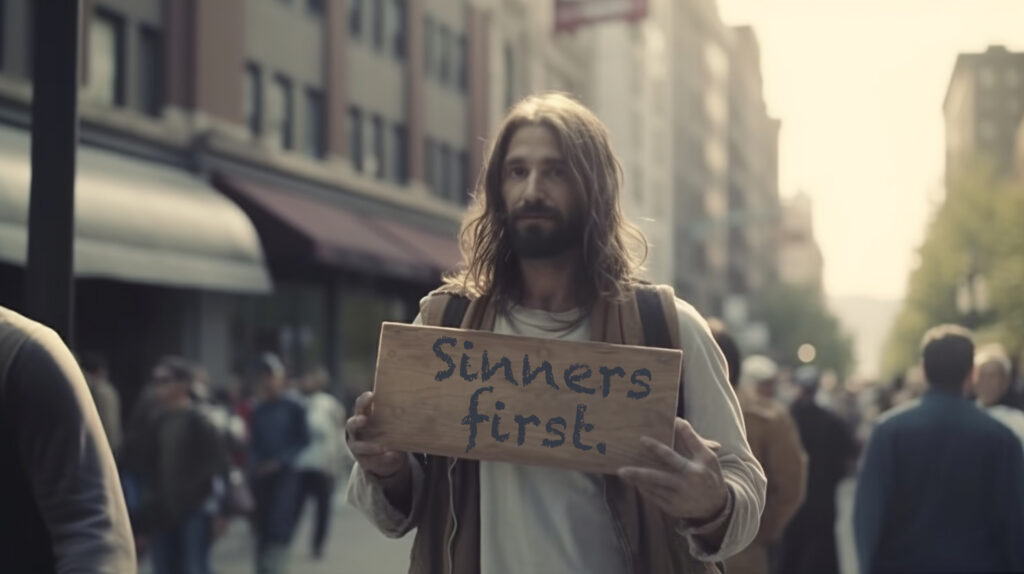Matthew 9:9–13 (ESV): 9 As Jesus passed on from there, he saw a man called Matthew sitting at the tax booth, and he said to him, “Follow me.” And he rose and followed him. 10
And as Jesus reclined at table in the house, behold, many tax collectors and sinners came and were reclining with Jesus and his disciples. 11 And when the Pharisees saw this, they said to his disciples, “Why does your teacher eat with tax collectors and sinners?” 12
But when he heard it, he said, “Those who are well have no need of a physician, but those who are sick. 13 Go and learn what this means: ‘I desire mercy, and not sacrifice.’ For I came not to call the righteous, but sinners.”
Just because someone is a tax collector, it doesn’t mean they are a sinner. Just because someone is called a sinner, it doesn’t mean that claim is true.
Barbara Brown Taylor reminds us that Jesus was a “Jew.” He taught Torah with the expertise of the best of Rabbis. Like any good Jew He was formidable in arguing the finer points of Mosaic law.[1] But on the surface of Matthew 9:1–13, it seems that Jesus’s Jewishness lacks something to be desired. If you are a Pharisee at least, this is what you might think.
If you want my opinion, I don’t think Jesus would have made a good Protestant either.[2]
Go and learn what this means: I desire mercy, and not sacrifice.
— Matthew 9:13a
Consider the setting of the text. Jesus has traveled from Nazareth to Capernaum. After a brief encounter with Matthew, who becomes one of Jesus’s disciples, we next find Jesus “reclining” with even more loathsome people—like other tax collectors and other sinners.
“Reclining!” That’s an interesting word given the context of the passage. It recalls drowsy Sunday afternoons, reclining in the La-Z-Boy, relaxed, stress free (at least for a little while). Not quite the same thing Matthew is talking about, but close. It speaks not only to an action (i.e., of reclining), but also a state of mind (i.e., relaxed). In its original Greek form the word for recline (ἀνάκειμαι = keimei . . . lay, set, place), is a past tense participle. A participle modifies a noun (person, place, or thing) The name Jesus is the noun being modified, meaning He is the focus of the action and attitude of reclining. Why is this important to know? Because Matthew is drawing our attention to two specific things.

First, the audacity of Jesus! What kind of good Jew reclines with sinners? What kind of righteous person acts as if he or she feels at home with sinners, comfortable with them, as if they are cut from the same cloth!? And to magnify the problem, it is important to note that in the first century, the act of fellowshipping—dinner—in someone’s home, was considered an act of intimacy. To be invited into someone’s home, to relax, let your guard down, take food from the same bowls and plates as others, drink wine from the same jars, engage in light conversation, create pathways to relationships, to be at ease with present company, said a lot about the people being invited and how well regarded they were. Afterall, not everyone in the first century could afford to put on big dinners. So those that did, did so at their own great expense, which reflected how well esteemed the guests were.
Imagine the perplexity of the Pharisees! The audacity of this homeowner (name not mentioned)! The audacity of those tax collectors! The audacity of those sinners! The audacity of Matthew! The audacity of Jesus!
The second thing Matthew is drawing our attention to (and perhaps the main lesson of this text) is that truth transcends opinion. As human beings, we are not defined by the opinions of others or their attitudes towards us. Truth isn’t predicated upon belief. Instead, it is a product of choice. Consider Jesus’s response to the question posed: “why does your teacher eat with tax collectors and sinners?”
“Those who are well have no need of a physician, but those who are sick. Go and learn what this means: ‘I desire mercy, and not sacrifice.’ For I came not to call the righteous, but sinners (9:12–13).”
In some ways I wonder who Jesus was referring to as “those?” The folks around the table? Were they sin sick? Matthew never says so, never reveals any specific sin. Or . . . was it the Pharisees? Perhaps both? The Greek form of the word “learn” (μάθετε = manthano) means to gain knowledge by skill or instruction. To gain! In other words, learning is process oriented. It occurs over time. For example, I am learning how to play the bass guitar. I’ve progressed nicely for someone who is self-taught. I’ve learned a few chords and can play along with a few easy songs. But I am by no means ready to go out on tour yet. And it’s interesting what Jesus is prescribing for them to learn: “For I desire steadfast love and not sacrifice, the knowledge of God rather than burnt offerings” (Hosea 6:6).
While Matthew abbreviates the Hosea quote, the central idea is to know that God’s desire is consistent love. To think of this in another way, God’s need to love is far greater than God’s obligation to judge. And that is the most audacious thing of all. This is not something we can learn or accept overnight. We must go and learn through the living of life and a willingness to be vulnerable to the truths we discover. No wonder Jesus wasn’t a very good Jew (and would likely be a far worse Protestant). In one fell swoop He turns our precepts of religious belief upside down. The streets of New Jerusalem will, in fact, be teaming with lepers, tax collectors, and sinners of every stripe.
Many moons ago back in my first appointment there was a new couple who visited our church one Sunday. This was a very small church and we considered ourselves fortunate to have any visitors from anywhere. And of course, we made them feel welcome, shook their hands, introduced ourselves . . . As the pastor I assured them they were welcomed in our little church, for we “welcome everyone.”
I never will forget what one of them said to me. “You mean you REALLY welcome everyone??” And of course, we never saw them again after that.
The reason why I say Jesus probably wouldn’t be a very good Protestant is because He seems to be relaxed in the places where I am the most uncomfortable . . . with sinners, with people the most unlike me (and perhaps even you), with the people who fit to a “T” all the particulars of what we may assume to be true about others (which may not even be true at all). In my world the old catechism that goes “for we all sin and fall short of God’s glory,” is true—just some folks fall a little further and a little harder than others.
Jesus turns the status quo on its head. Sinners first? Apparently so. Jesus’s formula for salvation doesn’t seem to work its way down from the divine heights of the Father’s throne to the depths of human sin and depravity. It appears to work from the bottom up. “For I came not to call the righteous, but sinners.” WOW! This is a strange place, this kingdom of God’s. I would have thought it worked the other way around.

[1] Duke Chapel, February 11, 2014 [https://youtu.be/LWgnO2Hl1nw]
[2] Ibid.




